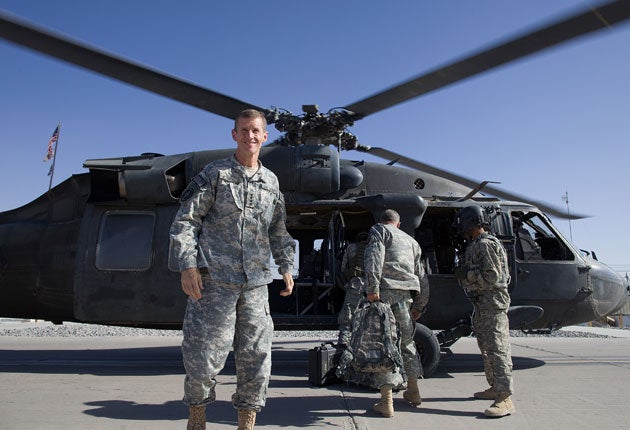McChrystal seeks to keep UK troops 'out of harm's way'
General aims to foil Taliban plan to make Afghanistan a British election issue

Barack Obama's top general in Afghanistan is considering a radical realignment of Britain's role in the country amid fears that the Taliban will target UK troops in the run-up to next May's general election.
General Stanley McChrystal, Nato commander in Kabul, believes Britain's continued involvement would be politically more palatable at home if its 9,000 soldiers were moved out of "harm's way" from the frontline in Helmand.
Senior defence strategists fear that the death toll of British soldiers, currently 230, could be as high as 400 by the time of the election in six months, as Taliban fighters try to exploit UK public concerns about the war.
The McChrystal plan would be welcomed by those arguing for a phased withdrawal in the face of rising British casualties. But it could be seen as a humiliating downgrading of Britain's status. A senior military source said: "Given the risks of a UK strategic withdrawal prompted by the high casualty rate over the summer, McChrystal feels the need to keep Britain 'in the fight' by withdrawing British forces from harm's way, by firstly pulling them back into a smaller area of operations commensurate with their resources; and secondly by transferring them to a 'capacity-building' rather than a 'frontline mission'."
Gordon Brown on Friday said British troops would stay in Afghanistan, but insisted that they could not be expected to risk their lives if President Hamid Karzai did not stamp out corruption after his clouded second-term victory. For the first time, the Prime Minister raised the prospect of the mission's failure, saying the UK and US would "succeed or fail together".
President Obama is considering General McChrystal's request for 40,000 more US troops, in addition to the 20,000 deployed earlier this year. A total of 68,000 US troops are now in Afghanistan.
Crucial to General McChrystal's thinking is that the US needs Britain to remain in Afghanistan to maintain the political alliance more than for military reasons, sources said. It was vital to keep Britain "in" or the alliance would crumble, and the McChrystal plan could limit British casualties.
A source familiar with General McChrystal's thinking said: "The Taliban knows that the British are the most vulnerable and susceptible to media and public criticism back home, and want to make the UK's presence an issue in next year's election. For this reason they are targeting British soldiers. Some strategists fear there could be as many as 400 British deaths by the time of the election."
Britain has been over-extended in Helmand, and its 9,000 soldiers have already been reinforced by 4,000 US troops. However, to a degree General McChrystal's hands may be tied, and he may be unable to send reinforcements to Helmand unless Washington meets his request for 40,000 troops in full.
A British military expert said: "Everyone is waiting to see how President Karzai responds to British and US demands that he stamps out corruption, gets rid of the warlords and works for national unity. If he doesn't, he could present several countries with the exit strategy they have been seeking. A key principle of counter-insurgency is that you are working in support of a legitimate government, and we haven't got that [in Afghanistan]."
In a speech to the Fabian Society in London, Foreign Secretary David Miliband emphasised the need for "soft power" alongside military might in Afghanistan. He said the ability of the West to advocate "soft diplomacy" was "more fragile because our values are contested and doubted, so we have to rebuild support for them and our ability to represent them".
Subscribe to Independent Premium to bookmark this article
Want to bookmark your favourite articles and stories to read or reference later? Start your Independent Premium subscription today.

Join our commenting forum
Join thought-provoking conversations, follow other Independent readers and see their replies